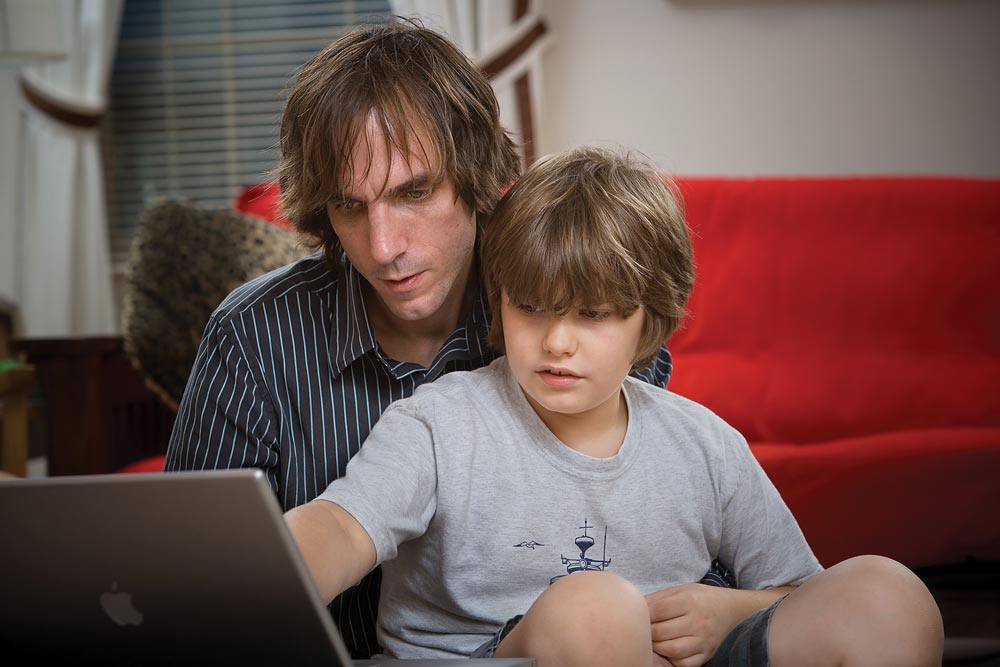Do You Hear What I Hear?
Professor interprets autism with music

Max Rasbury, 9, lies on his belly with his fingers and his eyes glued to his computer, playing and replaying a scene from a SpongeBob SquarePants DVD. He’s editing together scenes of Pee-wee’s Playhouse and SpongeBob SquarePants to create his own mash-up video he calls “Sponge Herman Square Suit.”
Just a few steps away, his father, Michael Rasbury, is also staring intently at a computer screen; he’s combining the sounds from a washing machine with synthesized music. Michael Rasbury is a sound designer, a composer and a professor of drama at UVA, and he recently co-wrote a play inspired by his son, Max Understood, a musical about a boy with autism named Max. The play premiered in New York in September.
In Max Understood, Max leaves his apartment to go on a real and imaginary journey through his neighborhood. Max encounters everyday people who transform into imagined creatures: a winged horse, a mermaid and a rapper. The music that Rasbury has written is minimalist and repetitive—think Philip Glass—and is intended to reflect the subjective experience of its autistic protagonist. Though the play’s focal point is Max, it also includes the emotional journey of Max’s parents, who learn to appreciate what it means to raise a child with autism.
Autism affects approximately 425,000 children in the U.S., but despite its prevalence, it remains enigmatic. It is a spectrum disorder that affects individuals in different ways and is only diagnosed through the presence of its symptoms. Rasbury believes that whatever factors cause autism may be present in everyone to some degree.
Rasbury tells a story about driving around Charlottesville with his son. “Max kept saying ‘I want to see the dogs.’” At first, Rasbury thought Max was just imagining things. “But then I realized there are particular power lines that look like the silhouette of a dog.” What seemed like daydreaming was actually a form of abstract creativity; Max saw a hidden connection between unlike things. Rasbury believes that when people with autism seem to be anti-social or aloof, they are often fixated on a creative realization about the world around them. “Max is a brilliant young man, and he inspires me every day with the way he thinks about things,” Rasbury says. Indeed, the incident inspired a scene in the play and a piece of music called “Powerful Powerlines.”
Max Understood upends the storytelling conventions that dictate that a hero must change to overcome a conflict. Max is the hero, but it is his overwhelmed parents who have the conflict—they have to realize Max does not need to change. “I’ve encountered parents [with autistic children] who are really fighting the situation and understandably so. An overarching theme [of the play] is learning that this situation is normal … inside of these kids, there’s somebody as normal as you or me who could have this conversation, but there’s a mixed up filter and it’s not coming out right.”
This is a revelation for the parents in the play, but as the title suggests, Max understood all along.
Max Understood is not the only work by a member of the UVA community that has featured autism. Perrin Chiles (Col ’99) produced Autism: The Musical, a documentary that follows five Los Angeles children with Autism Spectrum Disorders over the course of six months as they write, rehearse and perform a musical. It captures the struggles and triumphs of the children’s family lives and observes their creative process. The film is the flagship project of In Effect Films, co-founded by Chiles. “We’re looking to make films that have a double bottom line, that have some sort of social activism agenda, but something that people will see,” he says. Autism: The Musical was purchased by HBO, won several Emmys and was one of 15 documentaries on the Oscar watch list.